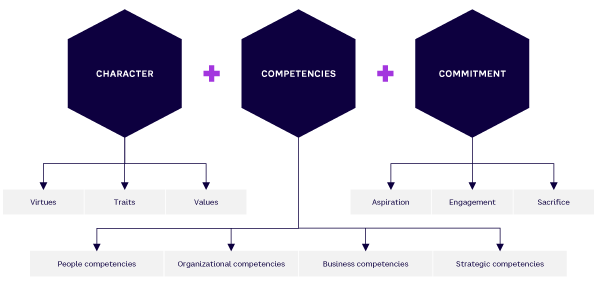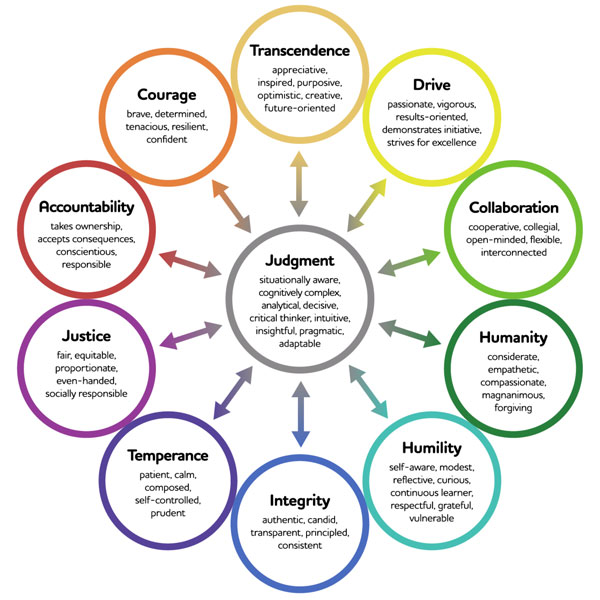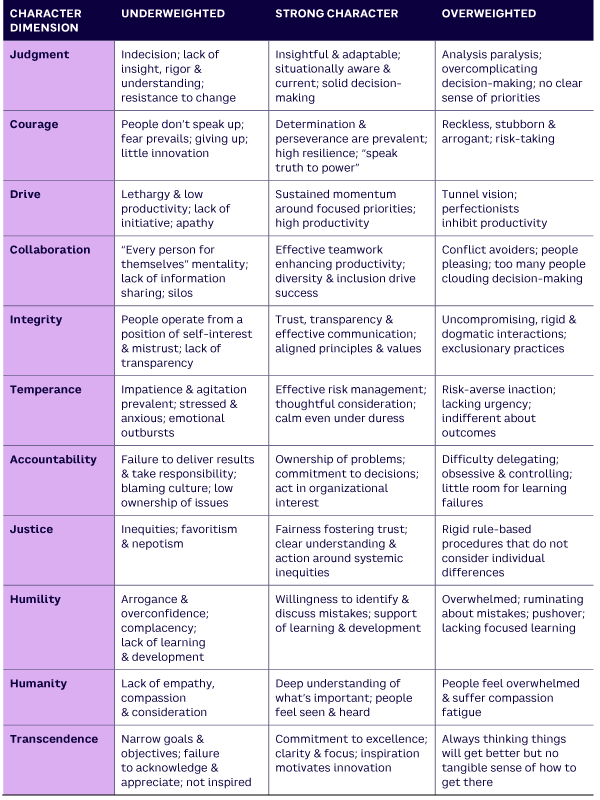AMPLIFY VOL. 36, NO. 12

Kimberley Young Milani explores the intersection of leadership, business, purpose, and sustainability in the contemporary world. She emphasizes the need for leaders to embody both competence and character. The article also looks at the intersection of character and organizational purpose, warning that without character, an organization’s purpose might become a hollow slogan or facade. Examples from Alan Jope, Unilever’s recently retired CEO, and Julia Hoggett, CEO of the London Stock Exchange, richly illustrate how character can shape purpose and leadership in real-world contexts. Ultimately, the article contends that character-infused, purpose-driven leadership can create a better world.
As the world becomes more complex, uncertain, and interconnected, so does the realm of leadership. Today’s reality requires leaders to not only fulfill their organization’s material goals, but also recognize and address the overlapping or compounding impacts of various organizational, social, and environmental effects that define its experience in and on the world. To achieve this, they must embody not only what good leaders do, but who good leaders are. This means leaders need more than certain competencies to successfully run their organizations — they must have the strength of character to cultivate superior performance and a sincere, authentic realization of their organization’s purpose and broader goals.
Today’s leaders must skillfully sit at the intersection where business, the environment, and society meet, interact, influence, and impact one another. It is at this intersection that organizational purpose is fulfilled, provided a leader can successfully get the traffic from these confluent forces to flow in a way that provides benefit to all stakeholders. In this article, leaders from Unilever and the London Stock Exchange (LSE) share their perspective and approach, as well as the efforts their organizations are undertaking to achieve this aim.
What Is Character?
Unfortunately, there continues to be an extensive, pervasive nescience of the power and impact of character on leadership. For decades, character received little attention in business schools or leadership development programs, resulting in a lack of emphasis placed on its foundational role in leadership, especially as it pertains to judgment and decision-making.1
Research on why character has been neglected in leadership discourse, education, and development programs reveals some key factors. First, there is a myth that character is innate or set at an early age and cannot be developed.2 Second, there is a misconception that character is subjective and thus cannot be measured. Character is considered a “loaded word” that is deemed extraneous to business, and business culture has not created a common language or consistent lexicon with which to talk holistically about character in the workplace.3
As such, it is important to first delineate how character, as it is used in this article, is defined and positioned within a leadership context. Based on the extensive research conducted by the Ian O. Ihnatowycz Institute for Leadership at the Ivey Business School, Canada, character can be understood through two foundational frameworks: (1) the Effective Leader framework and (2) the Ivey Leader Character Framework (ILCF).
The Effective Leader framework posits that leadership is always a function of character, competencies, and commitment in commensurate measure (see Figure 1).4 Significant performance problems arise when any of these three pillars are deficient.5 However, although all three pillars must be equally present for effective leadership, character underpins competence and commitment.

Character determines whether one will obtain the competencies necessary to perform (through one’s sense of humility and accountability) and influences the effort one puts into the role of leader (through one’s drive and courage).6 Because of this, it is especially problematic that there is a systemic lack of focused learning and development on character. Competencies reflect what a person can do, character reflects what a person will do, and those can be vastly different things.
ILCF outlines the character dimensions (virtues) and elements (behaviors) that operate in concert to promote good judgment and effective leadership (see Figure 2).7 In this article, “character” refers to these 11 dimensions operating in a networked capacity.

Although judgment is a dimension in its own right, ILCF reflects how it is influenced and formed through the interconnected relationship between all dimensions of character. As leadership is always contextual, character-infused judgment determines which dimensions are situationally appropriate to draw on, so one consistently makes good decisions at given moments, leading to elevated performance, enhanced well-being, and positive outcomes. In contrast, when some dimensions of one’s character are weak or underdeveloped, judgment is compromised, resulting in poor performance, diminished well-being, and negative outcomes.
Character-Enabled Purpose
At the Ihnatowycz Institute, we remain committed to bringing the language of character into business schools and organizations, but the phrases “purpose-driven leadership” and “purpose-driven organizations” have swiftly become dominant in the business vernacular.
One could argue that “purpose-driven” has reached buzzword status, becoming so ubiquitous that, for some, it induces eye rolling, cynicism, or the sense that it is a short-term fad rather than the enduring heart that guides an organization’s goals and aspirations, culture, and strategy.
This leads to the question of how character contributes to organizational purpose. If better outcomes are realized when performance is infused with strength of character, how can character-infused performance enable and enhance organizational purpose, especially one that serves multiple stakeholders and includes environmental, social, and governance (ESG) commitments? How can character-based leadership contribute to executing on and sustaining an organization’s purpose in an authentic and impactful way over the long term?
According to Nick Craig and Scott A. Snook in a Harvard Business Review article, “Academics argue persuasively that an executive’s most important role is to be a steward of the organization’s purpose. Business experts make the case that purpose is a key to exceptional performance, while psychologists describe it as the pathway to greater well-being.”8 If academics, business experts, and psychologists are correct, then to achieve this trifecta of outcomes, strength of character must be present. It is unfathomable that any leader whose character operates predominantly in a vice state, rather than a virtuous one, could possibly steward purpose, maintain performance excellence, or tend to well-being in a consistent, effective manner.
We must also ask how a leader builds a purpose-driven organization without understanding how their personal purpose fits into it. Research shows that fewer that 20% of leaders have a conscious understanding of their individual purpose, and even fewer can articulate it.9
Unilever is a multinational corporation renowned for being a purpose-driven organization. Its website states: “We are driven by our purpose: to make sustainable living commonplace. It’s why we come to work. It’s why we’re in business. It’s how we inspire exceptional performance.”10 According to Alan Jope, Unilever’s recently retired CEO, the intensity of the corporation’s commitment to purpose and how it translates into a purpose-driven culture starts with individual employees:
We have these purpose workshops that we put people through and from which we’ve got incredible data that shows that the workshops improve their ability to align their own purpose with the purpose of the organization or their job within it. For people who score highly on the alignment of their personal purpose and the job they are doing, their job satisfaction, likelihood to recommend Unilever to a friend or family member, and probability of staying with the company go through the roof.11
Unilever uses a top-down and bottom-up approach with their management cadre to foster a purpose-driven culture and organization. This tactic reveals that alignment with personal purpose enlivens Unilever’s organizational purpose to ensure it is nurtured and continues to grow.
This is a wise approach, according to organizational/management experts Ikujiro Nonaka and Hirotaka Takeuchi, who wrote: “The organization has evolved from information processing machine … to living organism … to survive in today’s world, this living organism must be grounded in moral purpose and guided by the goals of offering value to customers, contributing to society, living in harmony with nature, and creating a better future.”12
This is a tall order to assign to an organization. Without character leadership, organizations run the risk of their purpose becoming a hollow slogan or a facade, rather than an embodied corporate ethos. Once curious and demanding stakeholders pull back the curtain, so to speak, a lofty purpose without any tangible or sincere actions to fulfill it will appear as disingenuous, pandering, or deceitful.
By underpinning purpose with character (both through the organization’s leadership team and cultivating a character-infused culture13), an organization’s purpose will be transformative rather than performative, and it will have the power to create a better future.
Examples of Character-Enabled Purpose
The following examples show how each dimension can contribute to a character-enabled purpose to generate long-term strategic advantage and the socially responsible outcomes that progressive organizations seek to create.
If purpose is to be an enduring position of the organization, its leadership must employ transcendence in its creation. Behaviors associated with transcendence include being inspired, purposive, optimistic, creative, and future-oriented. Being inspired and purposive helps leaders capture their organization’s “why.” Being future-oriented ensures that purpose is abiding and enlivening. Creativity sparks unique opportunities to align an organization’s profit-based and ESG goals, and optimism fosters the belief that a purpose can be realized and fulfilled.
Humanity and justice underpin the behaviors needed to ensure that organizational purpose goes beyond profit to address things like sustainability and equity, diversity, and inclusion.
Drive and courage are required to sustain a profit-making strategy while standing up to those who would produce profit at the expense of people and/or the planet.
Integrity and accountability help leaders create a corporate purpose that is authentic, transparent, and responsible to all stakeholders, including shareholders. Temperance ensures that a multifaceted purpose does not go too far in one direction or another, bouncing over any organizational guardrails.
Collaboration fuels a sense of interconnectedness between the employees who work daily to fulfill the purpose and the stakeholders the purpose seeks to serve. Humility facilitates continual learning, knowing when to listen to stakeholders and acknowledging when it might be time to recalibrate a purpose-built strategy to create greater alignment and ensure the long-term viability and profitability of the organization. Finally, judgment ensures that the intricate and consequential decisions needed to successfully achieve an organization’s purpose are made wisely and efficiently.
A character-based approach to purpose also helps address the strategic paradoxes that tend to emerge when an organization simultaneously pursues profit and an environmental and/or social agenda. It can also help reframe an organization, helping it shift away from negative elements of its reputation or operations by providing a purpose that connects with the needs and attitudes of today’s society.
For example, Julia Hoggett, CEO of the LSE, is committed to changing how the UK’s capital markets are viewed, moving away from being “seen as something that ‘enables bankers to drive Lamborghinis’ to something that can help companies grow.”14 She stated:
It comes back to purpose … I describe the purpose of the LSE as a convener of capital. Our job is to bring together those who have capital with those who need it, in service of an objective — and the most important objective [today] is the just transition to net zero. We have transformed our business model over the last year to being one that is purely focused on the listed market, where our mission statement is to now be the first global exchange group in the world that is genuinely indifferent as to whether a company is public or private. Our job is to create the venues to facilitate the flow of capital. That is a purpose-led business model. It is not fluffy. It fundamentally changes the way you think about what your job is there to do. I’ve the privilege of trying to transform what I described as a 300-year-old fintech. My job is to make sure that it is just as viable, just as vibrant, and just as effective in another 300 years as it is today. That isn’t by doing the same thing, it’s by changing it. These sorts of concepts have been integrated into the way I think — not just about myself, but the way I think about what is the job of capital markets, and how we frame our job. Purpose is utterly critical in these things. It isn’t a soft, soppy concept in my head.
Many dimensions of character emerge in her response, including the courage to change an age-old system, the creativity to design a new one, the justice and integrity to ensure it serves everyone from pensioners to the planet, and the transcendence and judgment to ensure a new business model can withstand the test of time.
Hoggett credits character with helping her become the successful executive she is and informing her creation of a character-infused purpose for the LSE that can serve a wide range of stakeholders:
I had the Leader Character Framework … stuck on my computer screen for years when I was at the Financial Conduct Authority … the components of the framework make absolute sense and are central to how I think and act, or try to. The dimensions are comforts rather than challenges, you know? It’s always easier to do the right thing, even if it is harder. You learn that the more crises you’ve had to manage. Even if it’s difficult in the moment, the comfort and the confidence that it is the right thing to have done is much more sustaining than having done the convenient thing in the short term.15
Jope echoed Hoggett’s assertion that purpose is not fluffy or soft when responding to the accusation from Terry Smith of Fundsmith that Unilever had “lost the plot” for declaring a purpose for Hellmann’s Mayonnaise:16
Of course, that is catnip for newspapers, absolute gold, so it got blown out of all proportion. What Terry was really saying was, ‘I’m not happy with your share price performance.’ Unfortunately, he picked the wrong root cause, because right now, Hellmann’s is one of our most campaigning brands on the platform of ‘Make taste, not waste.’ It is our effort to help tackle the issue of food waste because if food waste itself was a country, it would be the third-biggest carbon emitter in the world … Unilever has 13 brands with sales of more than €1 billion — and through the first half of this year [2022], the pattern continues; Hellmann’s grew 19% and was the fastest growing of all of our billion-euro brands. In large part, it is because of this cool campaign that has been on for a while now.17
It is reasonable for Smith, as a major shareholder, to be disappointed in Unilever’s share price, but the “lost the plot” story grossly misrepresented Unilever shareholders’ commitment to sustainability. In 2020, the Unilever executive team created a Climate Transition Action Plan it put before shareholders for a nonbinding advisory vote.
Jope shared, “In the end, it went through with 99.6% shareholder approval, so we were rather pleased about that. I can tell you this … stereotype of shareholders not caring about sustainability is absolute nonsense. Shareholders overwhelmingly want to see companies raise their game in this.”18
Embedded in this story is how character dimensions like transcendence, courage, accountability, and justice are foundational to Unilever’s executive team and its shareholders’ dedication to the company’s purpose.
Conclusion
The world is in dire need of leaders who can tackle the grand challenges of our time. By turning character-infused performance toward the fulfillment of organizational purpose, leaders can thrive at the intersection of business, society, and the environment — raising company profits while improving the prosperity, well-being, and security of people and the planet.
We need to generate greater awareness of the power of character, bringing it into our collective consciousness and our understanding and expectations of leadership. By infusing performance and purpose with character, we can create citizens, organizations, communities, cultures, and countries of character. In short, we create a better world.

References
1 Seijts, Gerard, et al. “Character Matters: Character Dimensions’ Impact on Leader Performance and Outcomes.” Organizational Dynamics, Vol. 44, No. 1, January–March 2015.
2 Crossan, Mary, William Furlong, and Robert D. Austin. “Make Leader Character Your Competitive Edge.” MIT Sloan Management Review, 19 October 2022.
3 Crossan, Mary, Gerard Seijts, and Jeffrey Gandz. Developing Leadership Character. Routledge, 2015.
4 Crossan et al. (see 3).
5 Crossan et al. (see 3).
6 Seijts, Gerard H., and Kimberley Young Milani. “The Application of Leader Character to Building Cultures of Equity, Diversity, and Inclusion.” Business Horizons, Vol. 65, No. 5, September–October 2022.
7 Crossan, Mary M., et al. “Toward a Framework of Leader Character in Organizations.” Journal of Management Studies, Vol. 54, No. 7, November 2017.
8 Craig, Nick, and Scott A. Snook. “From Purpose to Impact.” Harvard Business Review, May 2014.
9 Craig and Snook (see 8).
10 Unilever website.
11 Seijts, Gerard H., and Kimberley Young Milani. Character: What Contemporary Leaders Can Teach Us About Building a More Just, Prosperous, and Sustainable Future. ECW Press, forthcoming 2024.
12 Nonaka, Ikujiro, and Hirotaka Takeuchi. “Strategy as a Way of Life.” MIT Sloan Management Review, 12 August 2021.
13 Crossan et al. (see 2); see Appendix for how character manifests in organizational culture when it is present or absent.
14 Clarke, Paul. “LSE Boss Julia Hoggett: Capital Markets Are Seen as Something That ‘Enables Bankers to Drive Lamborghinis.’” Financial News, 28 April 2022.
15 Seijts and Milani (see 11).
16 Agnew, Harriet. “Unilever Has ‘Lost the Plot’ by Fixating on Sustainability, Says Terry Smith.” Financial Times, 11 January 2022.
17 Seijts and Milani (see 11).
18 Seijts and Milani (see 11).



